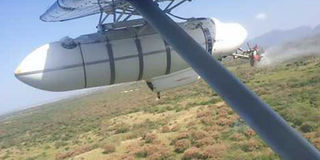Locusts: Aerial spray hurts ‘useful insects’

Aerial spraying of desert locusts in Mariara area in Meru County. PHOTO | NATION MEDIA GROUP
What you need to know:
- The government has been spraying locusts in Samburu, Isiolo and Marsabit counties where pastoralism is a major source of income.
- Besides being a source of livelihood, bees help in pollination and a decline in their population may have a huge economic impact.
- The insecticides can cause serious harm to cattle and birds that may feed on the dead insects or the sprayed plants.
The aerial spraying of locusts ravaging northern Kenya could lead to a massive decline in the population of bees and other useful insects.
The government has been conducting the exercise in Samburu, Isiolo and Marsabit counties where pastoralism is a major source of income.
Environmentalist Jack Raini says the safety of useful insects like bees and ladybugs could be jeopardised by the massive spraying, which has been ongoing for close to three months now.
BEE KEEPING
This spells doom for pastoralists who depend on livestock and bee keeping, as the insecticides can cause serious harm to cattle and birds that may feed on the dead insects or the sprayed plants.
“The government should be careful with aerial spraying because it may lead to another disaster in the north. Important insects like bees in the forests can perish as a result of aerial spraying yet they are useful to the ecosystem,” said Mr Raini.
He also said the spraying might result in the deaths of birds in forests in Samburu, Isiolo and Marsabit since they are likely to feed on the dead locusts.
Besides being a source of livelihood, bees help in pollination and a decline in their population may have a huge economic impact.
Mr Raini urged the government agencies in charge of the spraying to be careful not to contaminate water bodies.
He urged the government to follow proper guidelines to avoid any adverse effects from chemicals.
However, aerial spraying teams have denied that chemicals used are harmful to humans and the environment.
NEW GENERATION
Samburu County special programmes chief officer, who is coordinating the aerial spraying, disputed the claims saying thorough testing has been done to ascertain the success of the chemicals in killing locusts without affecting livestock, plants and residents.
He said several factors are always considered, among them the size of a swarm, nearness to water bodies and settlement areas before the spraying.
Meanwhile, a new generation of desert locusts has hatched in the northern counties and formed swarms close to 100 times larger than the wave that descended on the region from Somalia and Ethiopia. The locusts have also invaded the drier parts of Nyandarua County for more than a week, causing massive destruction of vegetation.
The swarms were first reported in Leshao Pondo Town in Ndaragua last Monday, where they camped for a day before moving to Mbuyu sub-location. They then migrated to Uruku area, on Wednesday, before returning to Mbuya on Thursday afternoon.
HIGH ALERT
At Mbuya area, Ms Lucia Kepha lost three acres of nappier grass to the pests. Nyandarua Agriculture executive James Karitu says the department is marking all affected areas.
In the North Rift, locusts have invaded parts of Trans Nzoia, Bungoma, Elgeyo-Marakwet, Baringo, West Pokot and Turkana counties, damaging hectares of food crop and vegetation.
In Trans-Nzoia, maize farmers plan to delay planting of the crop after swarms were sighted in Matumbei, Kapretwa and Mankhele areas.
“A swarm of locusts reported ly crossed into the county from Uganda through Kapnandi,” said Mary Nzomo, Trans Nzoia Agriuculture executive.
In Uasin Gishu and Nandi, county officials are on high alert over possible invasion after the insects were spotted in the neighbouring counties. Nandi Agriculture executive, Dr Kiplimo Lagat, said they have recalled officers on leave.
“We have directed the agriculture officials to remain on high alert and support farmers in the sub-counties should desert locusts invade our farms,” he said.
In Elgeyo Marakwet, the locusts have invaded Soi south, Tambach and Emsoo in Keiyo North and South.
Agriculture Cabinet Secretary Peter Munya said the government was running out of pesticides due to procurement challenges.
Reported by Geoffrey Ondieki, Waikwa Maina and Barnabas Bii



